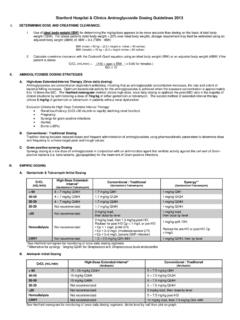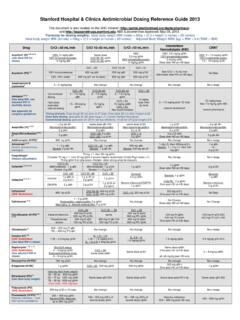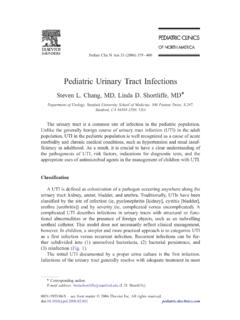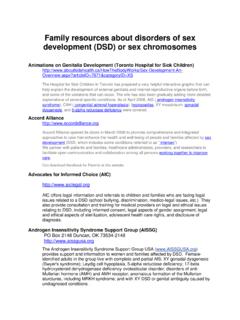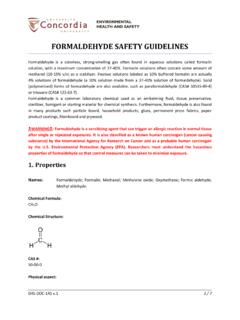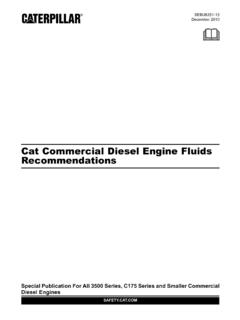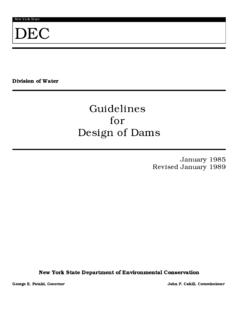Transcription of COVID-19 GUIDELINES FOR PPE USE - Stanford Medicine
1 CURRENT RECOMMENDATIONSOur current practice meets and/or exceeds the current CDC and state GUIDELINES . These GUIDELINES do notrecommend the use of an N95 mask when treating asymptomatic patients. Most of the evidence suggests that this is transmitted only by regarding the use of additional personal protective equipment (PPE) must be made based upon the best use of available prioritize healthcare worker safety and PPE preservation over education during the COVID-19 pandemic. The ABSOLUTE minimum number of providers involved in care requiring PPE MUST be observed for any and Inpatient Non-ProcedurePatient EncountersNon-immunocompromised patients** Homemade masks are not recommended by any regulatory agencyIncludes patients undergoing active chemotherapy, active radiation, active immunotherapy, lung transplant, <1 y of other solid organ transplant or bone marrow transplant, neutropenia)
2 , bothpatient and provider/staff should wear a procedure mask unless patient falls into high risk exposure category, then the provider should wear an N95 patientsPurpose: To provide clear guidance on appropriate use of personal protective equipment (PPE) COVID-19 GUIDELINES FOR PPE USEP lease note the distinction between singleuseand re-usefor masks of all types.*Refer to Recommendations for N95 and Face Mask Extended Use and Re-use Documentfor guidance for extended use in drive-thru testing centers and/or dedicated COVID-19 + units or re-use in moderate risk for exposure Risk of Exposureto Providers/StaffHigh In-patient and AmbulatoryModerate AmbulatoryModerateLow Patient confirmedwith COVID-19 Patient underinvestigation(PUI) Influenza-likesymptomsbut notPUI for COVID-19 ( Cancer Center)
3 Exam involvingasymptomaticpatients Non-direct patient careroles Non-clinical environmentsPatientProcedure maskProcedure maskNothingN/AProvider/Staff Single use N95mask* Goggles Gown Gloves Procedure mask Goggles/FaceShield* Gown Gloves Procedure mask* Gloves SocialDistancingRecommended Optional: Procedural maskwith re-use* Refer to PPE Decision Treefor non-clinical rolesAs we stop the spread of COVID-19 , the safety of our staff, providers, and patients is our top priority *PAPR available if provider/staff failed N95 fit testINTERVENTIONAL PROCEDURESI ntubation & Extubation, procedures involving the upper respiratory tract and gastrointestinal tract withrisk for aerosolization, such as endoscopy, bronchoscopy.
4 And generating procedures of the aero-digestive tract and all other procedures*PAPR available if provider/staff failed N95 fit testHigh-Risk ProceduresLow-risk Procedures^:^These recommendations do not apply to the intubation portion of the procedurePurpose: To provide GUIDELINES on the appropriate use of PPE for specific patient encountersCOVID-19 GUIDELINES FOR PPE USEP lease note the distinction between singleuseand reusefor masks of all of Exposureto Providers/StaffHigh**Must be approved by chair of primary surgical department, Dr. Pearl and Dr. Wald (SHC) and Surgeon-in-ShiefDr.
5 Dunn and Dr. Fehr (LPCH)Low Patient confirmed with COVID-19 PUI Asymptomatic patients COVID-19 negative tested in last 72 hoursPatientProcedure maskNothingProvider/Staff Single use N95 mask* Goggles orFace Shield Gown Gloves Surgical mask with goggles or face shield May choose reuse N95 mask* and MUSTuse face shield to allow for re-use** of mask (seepicture B on page 3) Gown GlovesRisk of Exposureto Providers/StaffHigh**Must be approved by chair of primary surgical department, Dr. Pearl and Dr. Wald (SHC) and Surgeon-in-Chief Dr. Dunn and Dr. Fehr (LPCH)Low Patient confirmed with COVID-19 PUI Asymptomatic patientsPatientProcedure maskNothingProvider/Staff Single use N95 mask* Goggles orFace Shield Gown Gloves Surgical mask Goggles or face shield Gown Gloves** Refer to Recommendations for N95 and Face Mask Extended Use and Re-use Document for guidance for re-use As we stop the spread of COVID-19 , the safety of our staff, providers, and patients is our top priority Purpose.
6 To provide GUIDELINES on the appropriate use of PPE for specific patient encountersCOVID-19 GUIDELINES FOR PPE USEP lease note the distinction between singleuseand reusefor masks of all Generating Procedures in Low-Risk Asymptomatic Patients and Exams ONLYB. N95 Mask and Face Shield A. Procedure Mask and Face Shield Asymptomatic patients undergoing nose, mouth, throat examProcedural MasksFace Shield GogglesN95 MasksGlovesGownExamples of PPE: Supply appearance subject to change based on availabilityCOVID-19N95 and FACE MASK EXTENDED USE AND RE-USE GUIDELINESN ormal useThe practice of using PPE for one encounter with one patient and then usePer CDC: Extendeduse refers to the practice of wearing the same N95 respirator for repeated close contact encounters with several patients, without removing the respirator between patient CDC.
7 Re-userefers to the practice of using the same PPE for multiple encounters with patients but removing it after each mask, including procedure mask and surgical maskMask covering nose and mouth to protect the wearer and/or the environment from respiratory droplets. Face masks are rated level 0-3 based on their fluid resistance; Level 2-3 are prioritized for use in the OR and for patient care involving risk for fluid maskRespirators used to protect the wearer from airborne particulates. These masks are also rated for fluid resistance. These require fit testing and fit of masks:Types of PPE use:DefinitionsImplementation:Re-use of procedure masks in direct patient care areas Safe re-use of procedure masks re-use in settings with low risk of exposure is critical to conserve PPE: below is the guidance to reduce the risk of self-inoculation.
8 Care must be taken to ensure that the health care provider does not touch the outer surface of the mask during care. Perform hand hygiene before and after touching ORadjusting the procedure mask Mask removal and replacement must be done in a careful and deliberate manner to avoid self-inoculation. The mask must be discarded if soiled, damaged, difficult to breathe through, or at the end of a single shift. Masks should be carefully folded for storage so that the outer surface is held inward and against itself. Perform hand hygiene after touching the mask. The mask must be stored in a clean paper bag labeled with the user s name.
9 Re-use of procedure masks in combination with a face shield may occur for use during low-or moderate-risk exposure encounters for patients who are not suspected or confirmed COVID-19 , as defined in the Recommendations for PPE Use : To provide GUIDELINES on the appropriate extended use and re-use of masks COVID-19N95 and FACE MASK EXTENDED USE AND RE-USE GUIDELINESRe-use of N95 respirators Re-use of N95s in combination with a face shield may occur for use during low-risk exposure encounters for patients who are not suspected or confirmed COVID-19 , as defined in the Recommendations for PPE Use document N95 respirators may be re-used for patients with suspected or confirmed TB The mask should be removed in the anteroom (hallway for LPCH)
10 And stored in a paper bag with the user s name The mask may be re-used for one healthcare worker for one shift If mask becomes grossly soiled or compromised during use, dispose of mask COVID-19 and other respiratory pathogens may also be transmitted by contact, therefore respirator re-use is NOTrecommendedExtended use of N95 respirators and face shields N95 Respirators may be used for extended periods of time only if: Staff are working in a COVID-19 testing area OR Staff are working in an inpatient COVID-19 landing zone with all confirmed COVID-19 patients Respirators must be used with a full face shield, in order to decrease the likelihood of contaminating the respirator Respirators and face shield may be used for continuous use for the entire shift, unless grossly soiled or compromised Discard N95 respirators that have become grossly soiled or compromised Full Face shield (see cleaning & disinfection tip sheet)
